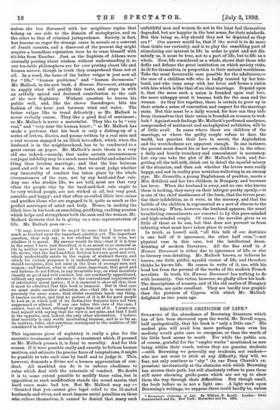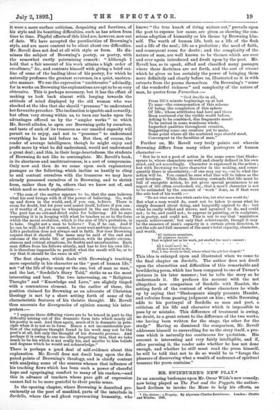BROWNING'S CRITICISM OF LIFE.* SPEAKING of the abundance of Browning
literature which has of late been showered upon the world, Mr. Revell urges, half apologetically, that his book is "only a little one." His modest plea will avail him more perhaps than even his modesty would quite care to recognise, or than the worth of his little book seems to merit. For while the public are, of course, grateful for the "ampler works" mentioned as now being within their reach, unless they are genuine students —with Browning we generally say students, not readers— who are not wont to stick at any difficulty, they will, we fear, not only continue to " shy " (to use Dean Church's ex- pression) involuntarily at the obstacles with which Browning has strewn their path, but will absolutely refuse to pass these still more alarming guide-posts which are set up to show them the way through their difficulties. But though small, the book before us is not a light one. A light work upon Browning's writings, we suppose there could hardly be, unless
* Browning's Criticism of Life. By William F. Revell. London: Swan Sonnenschein and Co. New York : Macmillan and Co. 1892.
it were a mere surface criticism, despairing and facetious, of his style and its besetting difficulties, such as has arisen from time to time. Playful efforts of this kind are, however, now out of date. We have accepted the peculiarities of Browning's style, and are more content to be silent about our difficulties. Mr. Revell does not deal at all with style or form. He dis- misses the subject of Browning's poetry, as poetry, with the somewhat curtly patronising remark : "Although I hold that a fair amount of his work attains a high order of excellence," &c., and contents himself with giving a brief out- line of some of the leading ideas of his poetry, for which he naturally professes the greatest reverence, in a quiet, unobtru- sive manner. We use the expression "unobtrusive" advisedly, for in works on Browning the explanations are apt to be so very obtrusive. This is perhaps necessary, but it has the effect of making us look back almost with longing towards the attitude of mind displayed by the old woman who was shocked at the idea that she should "presume" to understand her favourite preacher. The inclination is ignoble and cowardly, but often very strong within us, to turn our backs upon the advantages offered us by the "ampler works" to which Mr. Revell alludes, to open our Browning quite by ourselves, and taste of such of its treasures as our unaided capacity will permit us to enjoy, and not to " presume " to understand everything he has laid before us. But then, of course, the reader of average intelligence, though he might enjoy and profit more by what he did understand, would not understand a great deal ; and this, in their large-heartedness, the students of Browning do not like to contemplate. Mr. Revel's book, in its shortness and unobtrusiveness, is a sort of compromise. Only now and then do we come upon such explanatory passages as the following, which incline us hastily to cling to and content ourselves with the treasures we may have already possessed ourselves of in Browning, and to shrink from, rather than fly to, others that we know not of, and which need so much explanation :—
" The sum of the matter appears to be, that the man believes what his soul brings with it of the power of believing. Go walk up and down in the world, and, if you can, believe. There is room for doubt, but let your soul assert itself, believe if you can : or if worthy of it, you may be whispered in the ear from above. The poet has no cut-and-dried rules for believing. All he says respecting it is in keeping with what he teaches us as to the form which the moral evolution, which is the aim of life's probation, is to take. Ought not a man to believe P Yes, if he can. And if he can he will; but if he cannot, he must wait and take his chance. Life's probation does not always end in faith. Nor does Browning require that it should. The same may be said of the end and outcome of the whole life of probation, with its plastic circum- stances and critical situations its doubts and uncertainties. Each man differs from his fellows utterly, and has to live his own life ; it is therefore impossible to predict what the result will be, or to say that it should be the same in all."
The first chapter, which deals with Browning's teaching more especially in his character as the "poet of human life," not "of the life of the many or the one, but of man as man," and the last, " Sordello's Story Told," strike us as the most interesting and best. The two intervening, on "Religious Thought" and "Knowledge and Love," are slightly tinged with a contentious element. In the earlier of these, the position claimed for Browning as an advocate of Christian theology is met by a short setting forth of some of the characteristic features of his theistic thought. Mr. Revell thus accounts for divergencies of opinion among his inter- preters :—
"I suppose these differing views are to be traced in part to the difficulty arising out of the dramatic form into which nearly all his poetry is cast. And then again, much of it is dramatic in prin- ciple when it is not so in form. Hence a not inconsiderable por- tion of the religious thought found in his work may not be the poet's at all, but only the thought of his dramatis persona. And perhaps it is owing to our too often forgetting this that we take much to be his which is not really his, and ascribe to him beliefs and dogmas which he would not acknowledge."
There is perhaps a good deal of self-evidence about this explanation. Mr. Revell does not dwell long upon the dis-
puted points of Browning's theology, and is chiefly content with analysing some of the sources whence that influence of his teaching flows which has been such a power of cheerful hope and upspringing comfort to many of his readers,--and this in advance of teachers whose pure gift of expression cannot fail to be more grateful to their poetic sense.
In the opening chapter, where Browning is described pre- eminently as the poet of mankind, parts of the interlude in
Bordello, where the sad ghost representing humanity, who knows the true knack of tiring suitors out.," prevails upon the poet to espouse her cause, are given as showing the con- scious adoption of humanity as his theme by Browning him- self. The worth of human life, both as a life of the flesh and a life of the soul ; life as a probation ; the need of faith, and consequent room for doubt ; and the complexity of the nature of man, are well known to be themes which are over and over again introduced and dwelt upon by the poet. Mr. Revell has, so to speak, sifted and classified many passages where these doctrines are set forth, and the sort of resume- which he gives us has certainly the power of bringing them more definitely and clearly before us, illustrated as it is with extracts from the poems themselves. On Browning's "sense of the wonderful richness" and complexity of the nature of man, he quotes from Paracelsus :— " God dwells in all,
From life's minute beginnings up at last To man—the consummation of this scheme
Of being, the completion of this sphere
Of life ; whose attributes had here and there Been scattered o'er the visible world before, Asking to be combined, dim fragments meant To be united in some wondrous whole, Imperfect qualities throughout creation, Suggesting some one creature yet to make,
Some point where all the scattered rays should meet, Convergent in the faculties of man."
Further on, Mr. Revell very truly points out wherein Browning differs from many other portrayers of human character
But he is not a poet of action in the same sense that Shake- speare is, whose characters are well and clearly defined in his own. mind, and act accordingly. Character is expressed in the action ; but with Browning we have character in the making, and conse- quently there is uncertainty,—if one may say so,—as to what the action will be. You cannot be sure what line will be taken as the soul develops. While then, Browning contends that life must be full of energetic action, he yet gives special prominence to an aspect of life often overlooked, viz., that a man's character is not to be estimated by the amount of 'work' done, as if that were the sole test of his worth :—
"Tic not what man does which exalt, him, but what man would do.'
But what a man would do, must not be taken to mean what he simply dreamed about doing, and languidly aspired to do : but what he really willed and strove, and agonised to do, and could not ; to be, and could not ; to express in painting, or in sculpture, or in poetry, and could not. This is not to say that aspiration equals achievement,' but only that achievement, though it may be the measure of man's capacity in a certain given direction, is not the sole and full measure of the man's total capacity, character, and worth.
All instincts nnmature, All purposes unsure That weighed not as his work, yet swelled the man's amount : "• ' • ***** All I could never be.
All men ignored in me, This, I was worth to God, whose wheel the pitcher shaped.' "
This idea is enlarged upon and illustrated when we come to the final chapter on Bordello. The author does not dwell upon the obscurities and difficulties of this remarkable and bewildering poem, which has been compared to one of Turner's pictures in his later manner ; but he tells the story as he understands it. He prefaces his account with the not altogether new comparison of Sordello with Hamlet, the setting forth of the contrast of whose characters he winds up by saying that "Shakespeare simply presents Hamlet, and refrains from passing judgment on him ; while Browning adds to his portrayal of Sordello as man and poet, a criticism of his life and character which is impossible to pass by or mistake. This difference of treatment is .owing, no doubt, to a great extent to the difference of the two works, one having been written for the stage, the other for the study." Having so dismissed the comparison, Mr. Revell addresses himself to unravelling for us the story itself, a pro- cess which is naturally too continuous for quotation. His account is interesting and very fairly intelligible, and if, after perusing it, the reader asks whether he has not done enough, and whether he still must read the poem himself, he will be told that not to do so would be to "forego the pleasure of discovering what a wealth of undreamt-of spiritual treasure the poem contains."











































 Previous page
Previous page